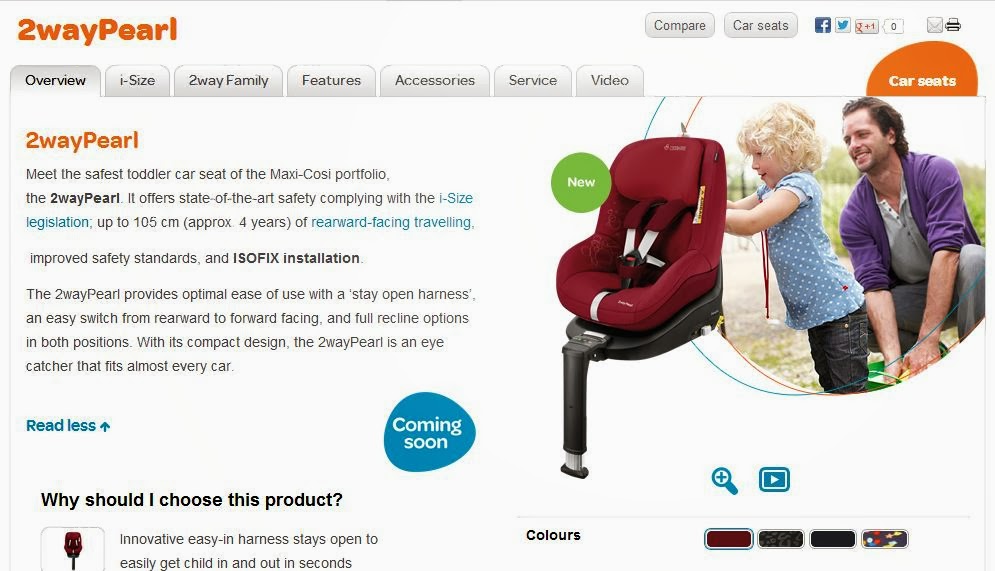As ex-ambulance control staff,
currently working in the nursery industry and a mum as well, I know too well
the importance of carseat safety. I’m carseat fitter trained and take great
care each time to ensure that J is secured properly in his carseat. I take the seat out of the car to clean it and re-fit it once a month to ensure it is working as it should be and is correctly installed. One of my pet hates
are people ignorant of the dangers of an incorrect carseat fitting in their
vehicle, incorrect use of the carseat harness (too loose) or people who are so
desperate for their child to go into a forward facing carseat as soon as
possible.
Rearfacing is safest. Extended
rear facing (known as ERF) has been around for ages, but it’s only in the last
few years that it has come to the UK and is becoming more common. Due to the
fact a baby and toddler has such a large, heavy head in comparison with the rest
of their body, plus the fact their neck and spinal muscles are less developed
than an adults, means that in an impact in a rear facing carseat they will be
pressed into the seat and the force
distributed across their shoulders. In a forward facing carseat, an impact will
cause their head to snap forward, putting extreme stress on their neck and
spinal muscles, which in some cases can be fatal.
 |
| The head of a baby / small child is much larger & heavier than that of an adult |
As one of the biggest carseat
manufacturers, Maxi Cosi noted the growing public call for ERF seats and became
heavily involved with a project for the next stage of carseat safety standard.
Currently, all European carseats have to meet ECE R44-04. This is an amended
standard of the previous one, and not a lot changed. In reality, to meet this
standard, a carseat is not put through its paces particularly well. For
instance, there is no rollover test or side impact test before the seat can be
awarded this standard. Maxi Cosi, on the other hand, have been exceeding the standard for quite a while by producing carseats which go above and beyond the
standard – but of course there is no additional award or standard that can be
given, so their carseats wear the same standard ECE badge as a cheap £20
carseat that barely meets standard. As a parent, how are you meant to know which
is the best option? Especially in these times of everyone being financially
stretched, it’s easy to see why parents do buy cheap carseats – after all, if
they all meet the standard, the only difference is the price, right? It may
come as a shock to many to learn that this is not the case. In fact, you could compare it to the difference between a supermarket value brand food and the finest range.
Maxi Cosi’s involvement in
developing the next stage of carseat safety standard has allowed them to put
forward their own ideals for what a carseat should be tested to before it is
sold and considered an optimum safety carseat. This standard is called iSize.
This new standard changes what criteria the product has to meet. Currently, the Maxi Cosi 2wayFix base when used in combination with the 2wayPearl is the only iSize approved carseat unit.
Under the current standard, your
standard Group 1 carseat is suitable from 9-18kg. As a guideline, the age
“approx. 9 months – 3.5yrs” is added. Many people don’t see the weight as being
the important bit, even though it is the vital information in this statement.
They ignore the “approx.” and as soon as their child is nine months old they
rush them into a forward facing carseat, whether or not they are the minimum 9kg weight. To discourage this, the new iSize
standard states that when using an iSize seat the child remains rearfacing til
15 months, regardless of height or weight. This is because it is not until 15
months that their neck muscles are developed enough to limit damage in an impact.
Maxi Cosi recommends when using an iSize seat that the child is rearfacing til
2 years. In a Maxi Cosi 2wayPearl (used in combination with 2wayFix base) the seat can be forward faced at 15 months or you can continue to use it rearfacing until 105cm (approx 4 yrs)
My son J has always been very
tall – as a baby he was very long. He outgrew his CabrioFix carseat at nine
months old due to his height, but he was nowhere near 9kg; which is why we then got him an Opal, and he remained rearfacing
til he was almost 19 months. I don’t have IsoFix in my car, so it takes some
option out of selecting a suitable carseat, but both my parents cars have
IsoFix and so our 2wayFix and 2wayPearl product testing is carried out using
their vehicles.

No comments:
Post a Comment